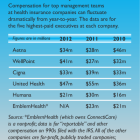Jobs study requested
Lawmakers Press For Thorough Review Of Two Health Insurance Mergers
|
Seventeen lawmakers are asking the state’s insurance commissioner for a fair and thorough review of two pending colossal health insurance mergers and a study on how they could affect Connecticut jobs. “The proposed Anthem-Cigna and Aetna-Humana mergers are likely to have a negative impact on both the cost and quality of care in Connecticut, permanently changing our state’s health care system for patients, physicians, and other stakeholders,” according to the lawmakers’ letter sent to Insurance Commissioner Katharine L. Wade. In a conference call Wednesday, legislators led by state Rep. Gregory Haddad, D-Mansfield, said, that the “mega-mergers” could drive up consumer costs, concentrating more than 64 percent of the Connecticut health insurance market in their hands and restricting provider networks. Legislators, in the letter, asked Wade to hold multiple public hearings across the state, grant consumer advocates intervenor status in the proceedings and commission a study of the impact the mergers would have on consumers in terms of health care cost and quality. Also, they want a review of how the mergers would impact Connecticut jobs. Haddad said there could be increases in deductibles, premiums and out-of-pocket costs and restrictions to provider choice as a result of the mergers.
